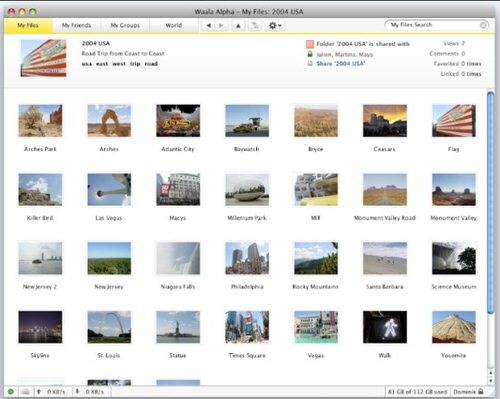Wuala puts a new twist on cloud storage. While typical cloud storage services move your data onto servers managed by the provider, Wuala also uses disk space on other members’ computers. Files are encrypted on the user’s own machine and the chopped up into little pieces and uploaded to Wuala’s servers, as well as numerous other users’ computers (Wuala calls this ‘social grid storage’) to provide a redundant storage solution. Wuala’s local client is written in Java and runs on OSX, Windows, and Linux.

Share It
While Wuala will happily sell you additional storage space (from $25 a year for 10GB to $1000 for 1TB), you can also trade your own local disk space for cloud storage space. If you share 5GB of space on your local drive, you will get an additional 5GB of online storage. Given how cheap hard disks have become, this seems like a fair trade-off. Users who share their local hard disk space can also turn off advertising on Wuala.
Wuala’s client basically looks like a local folder and you can decide if you want to share any of your files stored on Wuala with either your friends or a group of users.

Encryption: The Good and the Bad
Even with the strong encryption Wuala uses, though, the fact that some information is going to be stored on machines outside of even Wuala’s control is not going to sit well with a lot of people. While most private users can probably live with these risks (which are inherent in any cloud storage solution), businesses will probably stay very far away from Wuala.
There is also the question of how people will use Wuala – after all, the service provides almost unlimited and strongly encrypted storage. As Wuala has little control over what is shared on the network, Wuala might turn out to be a haven for rather unsavory activities. But then, the same can probably be said for most other cloud storage services as well.
Where’s the Money?
Wuala expects to monetize its service through advertising and in the German and Swiss market, where Wuala is based, they have also partnered with a photo printing service that will allow Wuala users to order prints of shared photos right from within Wuala. Besides this, Wuala is also selling storage space beyond the 1GB that every user who doesn’t share disk space gets by default.
The cloud storage market is highly competitive, but so far, no clear front-runner has emerged. Wuala’s competitors include Box.net, Dropbox, Mozy, as well as Apple’s Mobile Me and Microsoft’s various online storage services, including SkyDrive and Mesh. There are also various software solutions to make backing up to Amazon’s S3 more consumer friendly. All of these have different business models and feature sets, but Wuala’s simplicity and P2P sharing approach will make it very competitive.

















